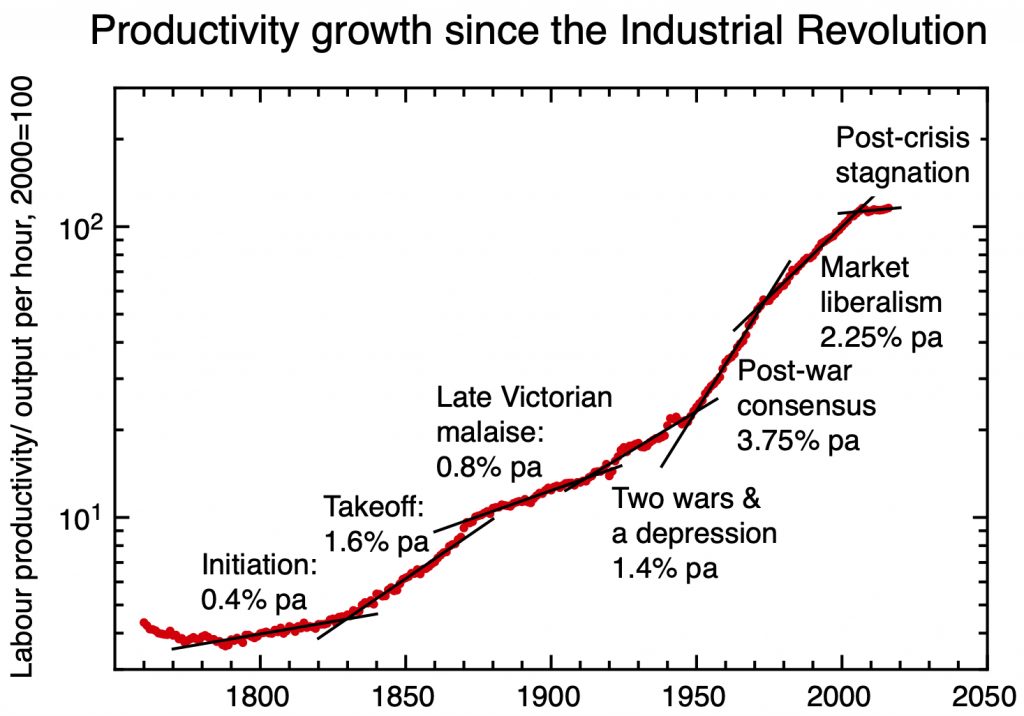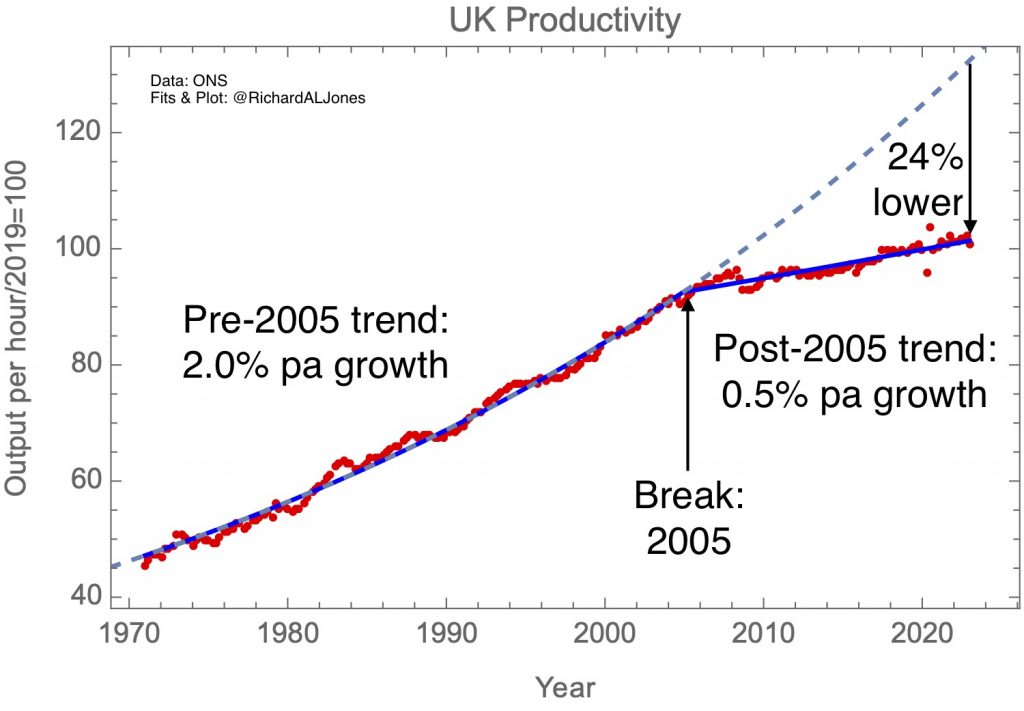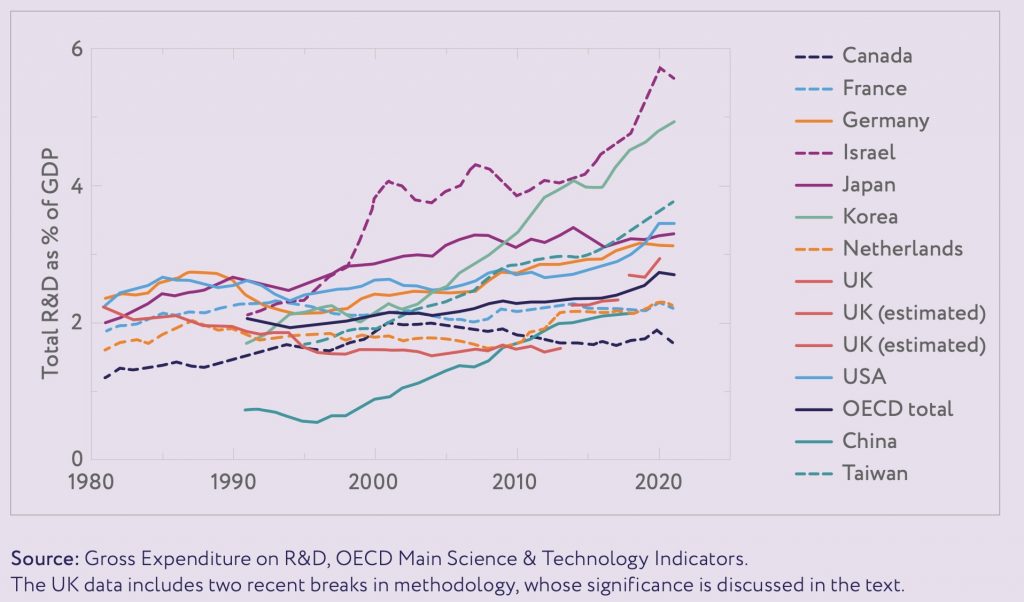Common readers of this weblog received’t want reminding that the UK is in a stagnant bind, with financial measures like productiveness and GDP per individual flatlining for the reason that international monetary disaster (or earlier). The results are felt properly past these arid financial aggregates; wage progress has slowed down, successive governments discover it exhausting to fund acceptable public providers, and there’s a palpable bitter sense of malaise in our politics.
One attention-grabbing response to this has been the emergence of a free constellation of commentators, activists and stress teams, a techno-optimist motion calling for extra homes to be constructed, for the boundaries apparently stopping the nation constructing infrastructure to be swept away, for cheaper and extra ample power.
Britain Remade desires to “reform the planning course of to ship extra clear power initiatives, transport infrastructure, and new good high quality housing at velocity”, whereas the yimby Alliance , as eager subscribers to the “Housing principle of the whole lot”, deal with the necessity to construct extra homes. A really extensively talked about paper, Foundations: Why Britain has stagnated focuses on housing, infrastructure, and the price of power. Rian Chad Whitton likewise focuses on excessive power costs, connecting this with the decline of the UK’s manufacturing base.UKDayOne deal with science, innovation and expertise because the motor for UK progress and prosperity, notably emphasising AI and nuclear energy.
I’m going to observe Tom Ough and Calum Drysdale in gathering these strands collectively underneath the banner “Anglofuturism”. Their eponymous, and attention-grabbing, podcast embraces a cheerful and optimistic model of this imaginative and prescient, with its whimsical AI generated illustrations of flying pubs and thatched house stations.
However I imagine the time period (in its present manifestation, at the very least) was coined by the journalist Aris Roussinos, in quite darker hues. This was a name for rebuilt state capability in a definitively post-liberal world, a imaginative and prescient that owed much less to Adam Smith, and extra to Thomas Hobbes, which some readers may assume extra acceptable to deteriorating geopolitical scenario we face.
I don’t assume there may be a wholly constant underlying political ideology right here, however I feel it’s truthful to say that there’s a typical centre of gravity on the centre proper. This isn’t the place to analyse political antecedents or implications, and I’m not the fitting individual to do this, however I do need to make some remarks about this rising motion.
There may be a lot on this agenda that I applaud and agree with. The UK must get again to productiveness progress, and there’s no elementary cause why that shouldn’t occur. We haven’t reached some last technological barrier – removed from it. And I feel there’s a profoundly humanistic perspective at work right here – folks ought to be capable of benefit from the fruits of prosperity.
In fact, there may be an opposing argument that believes that continued financial progress is inconsistent with planetary limits. It’s clear that we have to transfer to a brand new mannequin of financial progress that doesn’t impose externalities on the worldwide setting, and particularly we have to shift our power financial system to 1 that doesn’t rely upon fossil fuels. However to embrace “degrowth” is in my opinion each politically infeasible and, if ample will and sources are utilized, technologically pointless. To place it one other approach, the final 15 years within the UK have been an experiment in degrowth, and the outcomes have been ugly.
There’s an undercurrent of generational justice right here too. The notion that younger folks within the UK can’t look ahead to the identical life-style as their dad and mom is profoundly miserable. Nowhere is that this extra apparent than within the unaffordability of housing.
The place I feel these analyses are much less convincing is in figuring out the origins of our present issues. Particularly, I feel an evidence of our present productiveness stagnation must account for its timing. It’s definitely convincing to argue, as these authors do, that we’d be higher off if the UK had constructed extra infrastructure over the previous few a long time, however I don’t assume they actually persuade in speaking about what situations would have produced that final result. Anglofuturism, in all its varieties, might be accused of prepared worthy ends, with out actually specifying the means.

Labour productiveness within the UK for the reason that Industrial Revolution. Information from the Financial institution of England A millennium of macroeconomic knowledge dataset, plot & suits by the writer.
The Foundations paper places loads of blame on the 1947 City and Nation Planning Act – and the broader Attlee settlement. However I don’t assume this is smart when it comes to the timing. As my determine exhibits, the interval of quickest productiveness progress in your entire historical past of the UK passed off between 1948 and 1972. In actual fact, Roussinos harks again to this era, referring to “the optimism and excessive modernism of the post-war period, a vanished world of frenetic housebuilding and technological innovation the place British scientific analysis may lead the world, and produce increased residing requirements by way of its fusion with well-paid, high-skilled labour.”

Labour productiveness within the UK since 1970. ONS knowledge, match by the writer. For the rationale for placing the break round 2005, see When did the UK’s productiveness slowdown start?
What must be defined is that the present slowdown started within the mid-2000s. There may be some overlap with a growing consensus view from mainstream economics that the speedy drawback has been an absence of funding within the UK financial system (see e.g. The Productiveness Agenda). This contains public funding in exhausting infrastructure, non-public funding in capital items, and funding in intangibles like R&D. In my very own work I’ve emphasised the numerous discount within the R&D depth of the UK financial system between 1980 and 2005, and given the commonly technocentric flavour of the Anglofuturists, I’m shocked that this facet isn’t extra outstanding of their arguments.

From Analysis, innovation and the R&D panorama, by R.A.L. Jones, in The Productiveness Agenda.
Even when one agrees that funding ranges have been too low, there isn’t actually a consensus concerning the final reason for the shortage of funding. One frequent thread is a way that constructing infrastructure within the UK has change into too costly due to extreme regulation. In a single sense, it is a reflection of the truth that the comparative benefit of the UK is to be present in skilled providers. One can have fun that indisputable fact that the UK has change into a “providers superpower”, however the draw back was caustically expressed on this remark from Dan Davies
Giles Wilkes has mentioned what he phrases the “crud financial system” at a bit extra size. Financial actors reply to incentives, and this doesn’t at all times direct exercise in direction of the place we’d like it. As Giles places it: “We’d like vastly extra clear power, precise exhausting defence gear for dealing with nasty rogue nations, the troopers to make use of it, and way more quite a few and productive care and well being staff for the ageing inhabitants. Mitigating the harmful results of local weather change goes to take actual bodily capital and energy. These are precise exhausting issues – and having the ability to produce extra streaming movies, clever AI-related chat, or sensible authorized ‘options’ to monetary market issues will not be exchangeable for the belongings we’d like for the true issues. Simply because the lawyer’s charge is expressed in {dollars}, and so is the price of remodeling the US electrical energy system, doesn’t imply the 2 can get traded collectively.”
One factor all branches of Anglofuturism agree on is the necessity for ample, low cost power, and on the unhealthy financial results that present excessive industrial power costs are inflicting. This clearly causes robust emotions, to evaluate by the violent on-line response to Tom Forth’s solely affordable, from a classical market liberal perspective, feedback about this, arguing that, whereas this case was not good, it was “a smaller drawback and of a decrease precedence than many different restrictions on progress in Britain.”
I agree that it will be higher if power costs within the UK have been decrease, however I feel it is very important perceive how this case has arisen. Excessive industrial power costs now are inflicting critical issues for what business stays within the UK, however I don’t assume they are often blamed for the UK’s larger diploma of deindustrialisation that its neighbours. This passed off at a time when power costs have been low and falling.
The choice the UK authorities made within the Nineteen Eighties was that power was simply one other commodity whose provide might be left to the market. Because it occurred, this coincided with a second in time when the UK switched from being a internet importer of power, to being a internet exporter, having discovered ample provides of pure fuel and oil within the North Sea. North Sea oil and fuel manufacturing peaked round 2000, and the nation switched to being an power importer once more in 2004. The UK’s relative success in decarbonising its electrical energy provide initially relied on an early change from coal to fuel; even after the newer enlargement of offshore wind the value of electrical energy is about by the internationally traded worth of fuel. This was high-quality till it wasn’t – in the 2022 fuel worth spike.
If our drawback is that we depend on imported fuel, whose fluctuating worth is past our management, along with offshore wind, which is essentially intermittent (in addition to being generated a great distance from the place it’s wanted, linked by an insufficient grid), wouldn’t it not be higher if a a lot increased proportion of our power was generated by nuclear fission?
An enthusiasm for nuclear energy is a typical thread operating by way of all strands of Anglofuturism, and it’s one with which I’ve a lot sympathy. For all of the progress there’s been in renewable power, in 2022, 77.8% of our power nonetheless got here from oil, fuel and coal, and I feel it’s going to be tough to have a fossil-fuel free power financial system which doesn’t rely upon some nuclear energy to supply agency power . I deeply remorse the failure of the nuclear new construct programme of current governments – of the 18 GW of latest producing capability deliberate in 2014, solely 3.2 GW is even underneath building.
However I feel it is crucial, and salutary, to know why this failure has occurred. My current weblog posts go into the story of the UK’s civil nuclear energy programme in some element . There are methods during which the regulatory and planning framework for civil nuclear might be streamlined, however the elementary drawback with Hinkley C wasn’t the fish disco. It was the truth that the UK authorities wished the Chinese language state to pay for it, and the French state to construct it, because the UK state now not had the need or capability to do both.
The UK’s personal civil nuclear business was killed within the Nineteen Nineties; in an setting of excessive rates of interest and low pure fuel costs, and an ideological dedication to go away power provide to the market, there was no place for it. I do assume the UK ought to recreate its capability to construct nuclear energy stations, together with the small modular reactors which can be presently attracting a lot consideration, however I don’t assume this can occur with out substantial state intervention.
I agree with the Anglofuturists that we shouldn’t resign ourselves to our present financial failures. I feel we have to ask ourselves what has gone incorrect with the number of capitalism that we now have, that has led us to this stagnation. It’s an issue that’s not distinctive to the UK, however which appears to have affected the UK extra critically than most different developed nations. The slowdown appears to have begun within the 2000s, crystallising in full on the World Monetary Disaster.
This timing factors to adjustments within the nature of capitalism and political financial system that took maintain within the a long time after 1980, with the ascendancy of
market liberalism, the doctrine of shareholder worth in company administration, and an enthusiasm for outsourcing authorities features to personal contractors, irrespective of how central to the core functions of the state they could seem like. Within the UK, even the Atom Weapons Institution has been run by non-public contractors since 1989, with the federal government solely taking possession and management again from SERCO in 2020.
We’ve got a brand new type of globalisation that adopted from abolishing capital controls, along with a conviction that one doesn’t want to fret concerning the steadiness of funds, despite the fact that the persistent commerce deficits the UK has run since then has meant possession and management of nationwide belongings has moved abroad. We’ve got a monetary system that appears unable to direct sources to these actions that result in long-term progress. We’ve got a hollowed out state, that now lacks the capability even to be an knowledgeable and efficient contractor for providers.
I agree with the Anglofuturists that our present stagnation isn’t inevitable, and I applaud their lack of defeatism. It doesn’t should be this fashion – however to get past our present malaise, I feel we have to ask some deeper questions on how our financial system is run.


